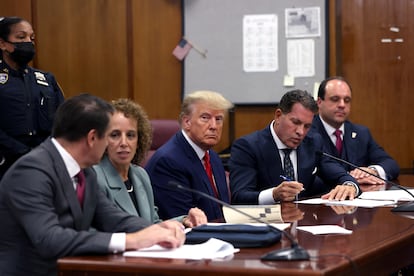The Trump case: Equality before the law
A judge has accused the former president of 34 counts, while the Republican is using the case to paint himself as a victim and boost his chances of winning the White House

It may have been unprecedented, but no one was likely surprised that it was Donald Trump who on Tuesday became the first sitting or former president in U.S. history to be indicted on charges backed by a grand jury. If anyone has done enough to get to this point, it’s him. In the past 50 years, Trump has faced numerous civil and criminal cases for a wide range of crimes; six bankruptcy scandal, a special counsel investigation and two impeachment votes, which, if successful, would have seen the real estate mogul answer for crimes such as abuse of power, obstruction of justice, conspiring with the Kremlin in the 2016 election, interference in the electoral count and incitement to insurrection.
He has enjoyed impunity up till now, largely thanks to the Republican Party, which has been overrun by a far-right, populist electorate since at least the 2016 presidential primaries. So much so, that the group handed Trump the candidacy, the presidency and control of Abraham Lincoln’s veteran party. But it was Trump himself who was able to take advantage of his popularity as a TV personality and make use of the destructive force of social media to reach the pinnacle of power, which he directly put at the service of his interests, including family businesses. He would not have emerged unscathed from three extensive investigations carried out by the Department of Justice and the House of Representatives if it weren’t for the dutiful exonerating actions of the attorney general, William Barr, the Republican leader of the Senate, Mitch McConnell, and the entire Republican elite, with notable exceptions such as former Senator Liz Cheney.
Compared with the unsuccessful investigations so far, and with those that are underway — for Trump’s role in the assault on the Capitol, handling of classified documents and attempts to interfere in the electoral count — the Stormy Daniels case over hush money paid to the porn star to cover up an alleged extramarital affair has the least criminal consequences. But Trump’s legal woes are set to get a lot more complicated. For now, the former president is charged with 34 felony counts of falsifying business records — which prosecutors may argue was done to cover up tax fraud and campaign funding violations. Trump has said he is a victim of a political witch hunt aimed at stopping him from returning to the White House in 2025, and has questioned the credibility of the New York justice system, arguing that the state, its elected officials and jurors are predominately Democrats. He has also said that the New York court does not have the jurisdiction to hear a case of electoral fraud, since this involves the presidential election campaign, meaning it should be the subject of a federal — not state — investigation.
Trump’s brief court appearance to hear the charges and plead “not guilty” has served as a spectacular start to his campaign: the donations are pouring in and Republicans have been forced to close ranks around him, even those set to run against him in the Republican primaries. Trump is once again leading the race, and it would be reckless to lower our guard, considering the possibility of another Trump presidency. This latest attack against the rule of law and democracy, in addition to what a Trump administration might mean for the war in Ukraine, is of extreme and serious consequence.
Sign up for our weekly newsletter to get more English-language news coverage from EL PAÍS USA Edition
Tu suscripción se está usando en otro dispositivo
¿Quieres añadir otro usuario a tu suscripción?
Si continúas leyendo en este dispositivo, no se podrá leer en el otro.
FlechaTu suscripción se está usando en otro dispositivo y solo puedes acceder a EL PAÍS desde un dispositivo a la vez.
Si quieres compartir tu cuenta, cambia tu suscripción a la modalidad Premium, así podrás añadir otro usuario. Cada uno accederá con su propia cuenta de email, lo que os permitirá personalizar vuestra experiencia en EL PAÍS.
¿Tienes una suscripción de empresa? Accede aquí para contratar más cuentas.
En el caso de no saber quién está usando tu cuenta, te recomendamos cambiar tu contraseña aquí.
Si decides continuar compartiendo tu cuenta, este mensaje se mostrará en tu dispositivo y en el de la otra persona que está usando tu cuenta de forma indefinida, afectando a tu experiencia de lectura. Puedes consultar aquí los términos y condiciones de la suscripción digital.









































